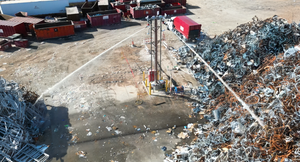When Does it Make Economic Sense to Sell Your Used Refuse Truck?
Brion Maguire, managing partner and general manager of Trucks & Parts of Pennsylvania, explains how to get the most value from a refuse truck.
October 18, 2017
Sponsored Content
Trucks & Parts, located in Tampa, FL and Glenmore PA, has bought, refurbished, and sold used garbage trucks since the 1970’s, and is among the first in the nation to offer solid waste management professionals high-quality used trucks to contain their costs while maintaining efficiency.
As refuse companies’ capital and operational expenses rise, so has demand for dependable, refurbished vehicles, and Trucks & Parts continues to lead in this space, serving public and private haulers as well as government agencies.
In this Q & A, Brion Maguire, managing partner and general manager of Trucks & Parts of Pennsylvania, explains how to get the most value from a refuse truck. He answers questions like, when is the best time to sell or trade? Exactly what do I consider in making this decision? And why would I choose to sell a truck other than my oldest one?
Is it better to sell or trade a garbage truck when it’s relatively new or when it’s older?
Brion Maguire: Garbage truck owners commonly think it’s best to sell their oldest truck. It may be simply because it’s the oldest, or because it’s paid for, and they will get 100 percent return on their investment. But, often, selling the oldest truck is a mistake.
Older trucks commonly have high miles and hours. They may be in rougher condition and may need significant repairs. With that said, these vehicles are harder to resell. Even if the truck is in good condition, retail consumers tend to think if it’s about 10 years old or older, it’s passed its useful life. But this is often just a perception. It may still be doing an excellent job and, if so, it could still have good value to the existing owner. So it may make business sense to keep it and sell a newer vehicle in the fleet that has more value and is more attractive to a buyer.
Newer trucks are in better shape, have fewer miles and are typically more valuable. So where is the sweet spot as far as time to sell a used garbage truck?
Brion Maguire: There isn’t a particular age where the depreciation and value curves intersect, showing when it makes most economic sense to sell. But, typically, it is more advantageous to sell when the truck is relatively newer, and worth more.
You should consider the age, miles and hours that the truck has spent on the road. And, of course, consider depreciation and loan value.
Each year maintenance goes up, and at some point there is an intersection where you decide whether to keep maintaining it or invest in a new asset and start over. That is an individual decision. But we think the sweet spot to get the most value is between four and seven years. It depends on the truck though.
Roll off trucks tend to hold their value because they have fairly simple mechanisms. While automated side loaders may not hold value quite as well because of the many moving parts and the “wear and tear” associated with their robotic arms.
Should an owner think about selling when repairs start costing more per year than the amount the truck loses in depreciation?
Brion Maguire: Yes. Maintenance costs start to really jump up in the fourth and fifth years of ownership. Additionally, often there are some major service repairs issues that will need to be addressed. At some point, there will come a time when the vehicle will need a rebuilt engine or transmission or other major repair. Even if the original engine and transmission are fine, potential buyers tend to worry these repairs are eminent, regardless of if there are indications this is the case.
Even of the limited customer base willing to buy an old truck with high miles, they are buying based on price. The return is likely not worthwhile.
So it’s important to sell equipment while it has good value and equity. And, again, ask yourself, if you have a 10- or 12-year-old- truck with 250,000 to 300,000 miles that runs well, why not keep it? At this point, that truck has more value to its owner than to resellers.
So selling newer equipment might yield more value?
Brion Maguire: Again, there isn’t a perfect age for selling as far as depreciation and price. But if you sell too early, you could lose out as, like with cars, these $190,000 to $290,000 vehicles depreciate as soon as you drive them off the lot while you pay high-dollar financing. You may not get back the balance on your loan.
On the other hand, once trucks reach their “end of life,” the value drops like a rock. And you are left with a high-maintenance vehicle requiring top-notch mechanics willing and able to invest a lot of sweat work.
When you buy the truck, what should you consider with regard to resale value?
Brion Maguire: When you order new, look for common specifications that are well liked in the industry. And once you buy the truck, put it on a scheduled preventive maintenance program as maintaining these vehicles is the biggest factor in retaining value over the years.
How else can Trucks & Parts help owners sell or trade their trucks?
Brion Maguire: We offer many solutions. Two scenarios where we can and often offer support is when unneeded surplus equipment is added to an inventory, either from an acquisition or from a municipal contract that is not renewed. With an acquisition, the buyer may plan to consolidate routes or the vehicle may not be configured or spec’ed for its needs. In either case, this is where Trucks & Parts comes in. We can buy whole fleets of any size and move the equipment fast and efficiently.
Each year we buy and sell over 800 refuse-related trucks. While we sell both new and used, the majority of our $10 million vehicle inventory is used refuse trucks. We are here to offer our expertise and assist you in buying or trading your surplus or non-productive vehicles.
Learn more at www.TrucksAndParts.com
You May Also Like


.png?width=300&auto=webp&quality=80&disable=upscale)